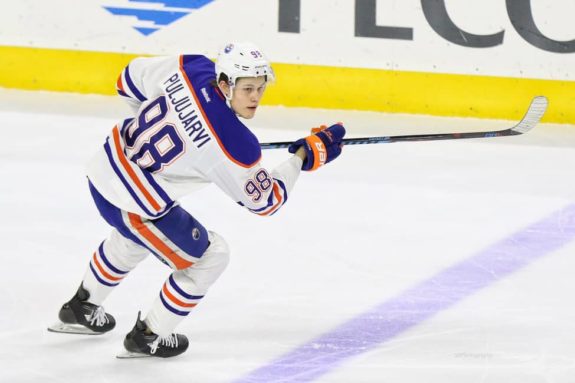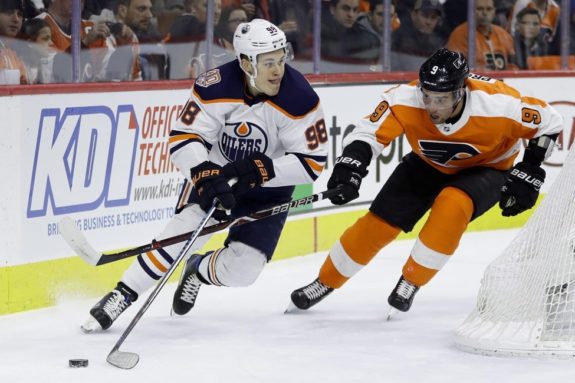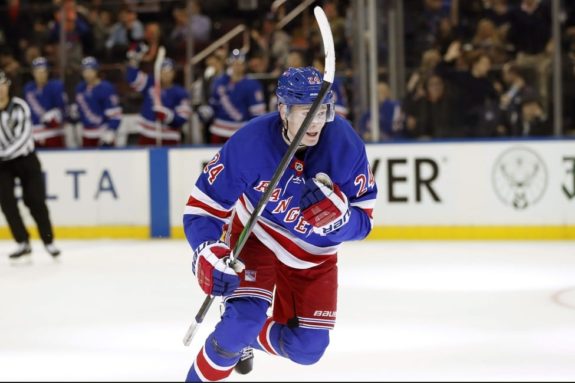A change in scenery is often the driving factor in an individual’s resurgent play. The New York Rangers know this better than anyone, with former Edmonton Oiler and New York Islander, Ryan Strome, currently producing at a point-per-game rate. The shift in teams can work wonders for a player’s development and overall performance, hence why the Rangers have found themselves connected to recent rumors of Jesse Puljujarvi.

The 2016 fourth-overall selection has essentially checked off nearly every box of a quintessential draft bust. After just 37 points in 139 NHL games over a three-year span, Puljujarvi finds himself without an NHL contract and playing for Kärpät of the Finnish SM-liiga.
The Oilers still maintain Puljujarvi’s rights, but they seem more inclined to let him stay the year in Finland or move him off to another team. His agent recently vocalized his desire for a change of scenery and unhappiness in Edmonton.
At just 21 years old, it seems harsh to call Puljujarvi a total draft bust and his ability to play in the NHL has entirely diminished, yet that’s where his career has quickly spiraled to. Still, the Rangers have all the assets and draft stock in the world to acquire the young forward and see if a change in scenery can’t be the ignition to the career he was expected to have in 2016.
The Price Is Right
First and foremost, if the Rangers were to acquire the rights to Puljujarvi, the price would have to be somewhat reasonable. If the Oilers are asking for anything above a second-round pick, Rangers general manager Jeff Gorton should be hanging up the phone real quick. Nikita Gusev cost the New Jersey Devils a third and second-round pick and he was coming off an 82-point, MVP-caliber campaign in the Kontinental Hockey League. The Oilers’ starting asking price should be well below that, especially when Puljujarvi seems inclined to stay away from the NHL at this point in time.
The return for the Finnish right-winger should reasonably be valued at a third-round selection and a decent prospect. Anything above that price and the thought of Puljujarvi in New York becomes a tad bit cloudier. There’s also the slight chance of a swap of Lias Andersson for Puljujarvi, but history says Gorton would be less inclined to make such an ambitious move of that caliber. We’re more than a year into the rebuild, and Gorton has a very well-mapped plan in effect, headed by the likes of Artemi Panarin, Kaapo Kakko, and Jacob Trouba. He won’t make a deal at this point in the season if it isn’t a reasonable deal that’d work out for the Rangers long-term.

Take, for instance, the Vlad Namestnikov trade. The return of a fourth-rounder and American Hockey League-bound player was accepted for the sole purpose of roster management. It’s given the Rangers a worse immediate roster, but the freed spot was used to bring up Filip Chytil, who’s shaping up to become the Rangers long-term second-line center. Bringing Puljujarvi to New York may not fill immediate holes in the Rangers lineup, but it could easily become a long-term benefit when all said and done.
Is He Still an Impact Player?
As stated before, Puljujarvi does little to fill an actual hole in the Rangers lineup. The right side of the lineup currently consists of Jesper Fast, Pavel Buchnevich, Kakko, and Brendan Smith. The arrival of Puljujarvi would likely mean Smith slides back over to the left-wing and Micheal Haley, Greg McKegg or Andersson would be back in the press box.
Head coach David Quinn’s roster versatility makes it tough to pinpoint exactly where Puljujarvi would fit in the lineup. If he were to accept a trade and sign in New York, one would have to assume he’d like a top-nine role. It’s also fair to assume he could slot in on either the left or the right side. Quinn certainly hasn’t shied away from that kind of roster movement in the past.
Puljujarvi’s 20 points in 18 games in the Liiga shows that he can certainly still play at a high level. He’s currently sixth in the league in points and third in the league in goals. Amongst the top-10 scorers in the Liiga, he’s committed the most penalties by a wide margin, logging 22 penalty minutes thus far this season. He’s also leading the league in shots and in individual Corsi-For percentage. He most recently led Finland to a 4-3 victory over Russian in the Karjala Cup. His line scored three of the four Finnish goals.
Puljujarvi’s peripherals match what a lot of the Rangers have been lacking thus far this season. Puljujarvi’s 6-foot-4 frame would actually make him the largest forward on the Rangers. His physicality and scoring touch would be a much-needed addition for the forward corps, especially in Quinn’s ideal play style and system.

With Chris Kreider seemingly in his final campaign as a Ranger, adding another sizable winger with considerable speed and puck protection makes reasonable sense. Not many wingers of Puljujarvi’s size can move at his speed, whether it be the NHL or the Liiga. His frame and speed alone are enough to warrant a roster spot.
Finnish Connections
If there’s one thing that has become particularly evident in Kaapo Kakko’s first 13 NHL games, it’s that the adjustment to life in North America is taking its toll on the 18-year-old rookie. The Rangers recently brought in Tuomu Ruuto as an advisor to Kakko, suggesting that his time thus far in the NHL has been particularly difficult.
The Finnish phenom publicly stated how nice it was to finally have someone around to talk to in his native tongue. Without another Finnish player in the Rangers’ current roster, Kakko is left to his second language in order to communicate with his new teammates. In time, his English should improve, but being able to interact with a friend from home could have a massive benefit on his overall mental health.

Keeping Kakko happy in New York should be the Rangers’ primary goal as they continue through the season. One could argue that the entire Rangers’ rebuild hinges on Kakko’s development. Bringing in Puljujarvi could certainly play a huge role in Kakko’s overall development and adjustment to the league.
The Washington Capitals brought in Sergei Fedorov for a young Alexander Ovechkin. Jussi Jokinen joined a 19-year-old Aleksander Barkov and his Florida Panthers. Having that native country connection can go a long way, especially for a rookie adjusting to the NHL grind.
If a deal should come to fruition, the Rangers would need to do so before the Dec. 1 deadline to sign the 21-year-old Finn. Otherwise, he’d be ineligible to play this season. Several aspects hinge on the Puljujarvi trade becoming a reality, but the Rangers seem to be in the best position to offer a suitable package and provide him with an immediate environment to succeed.